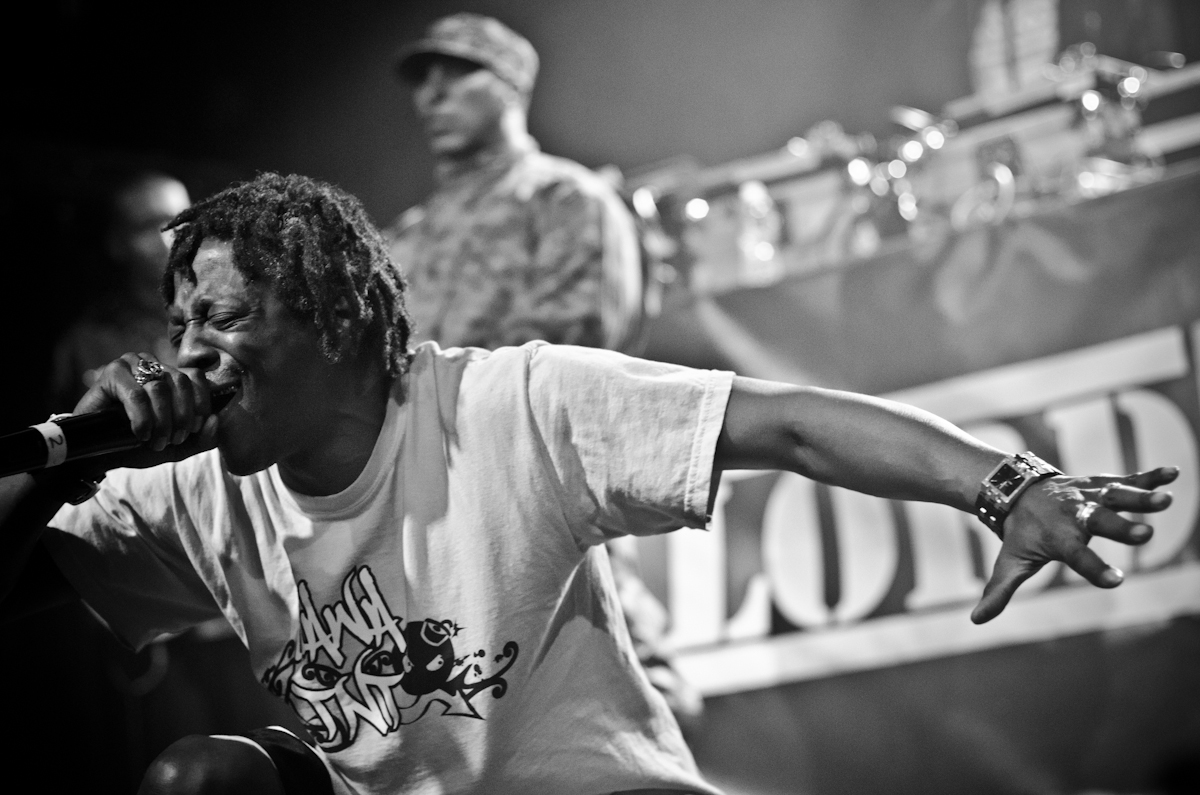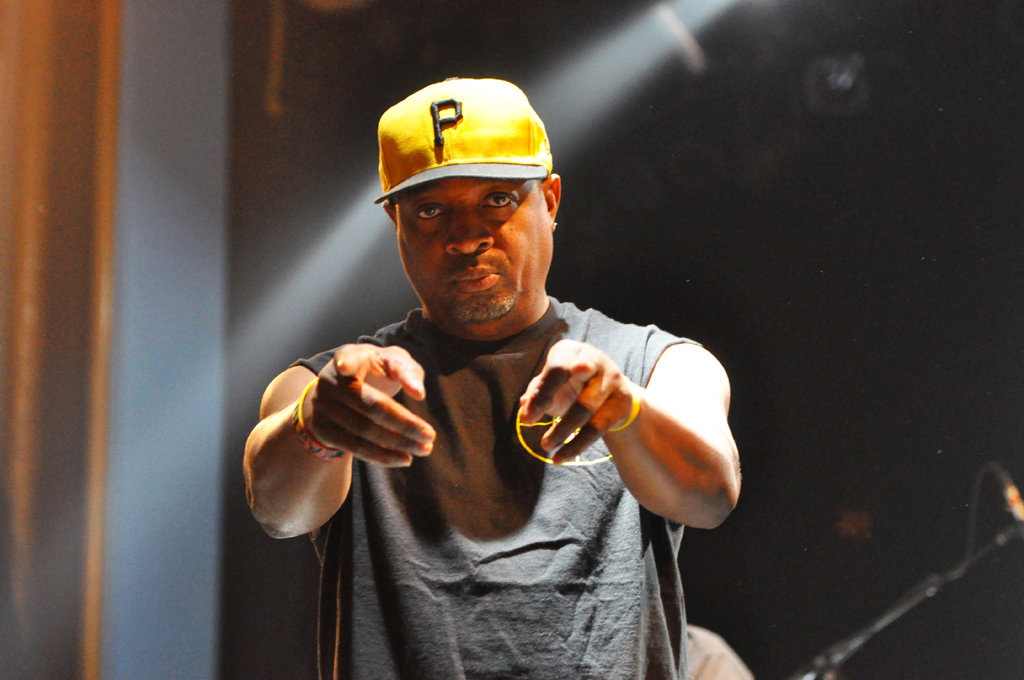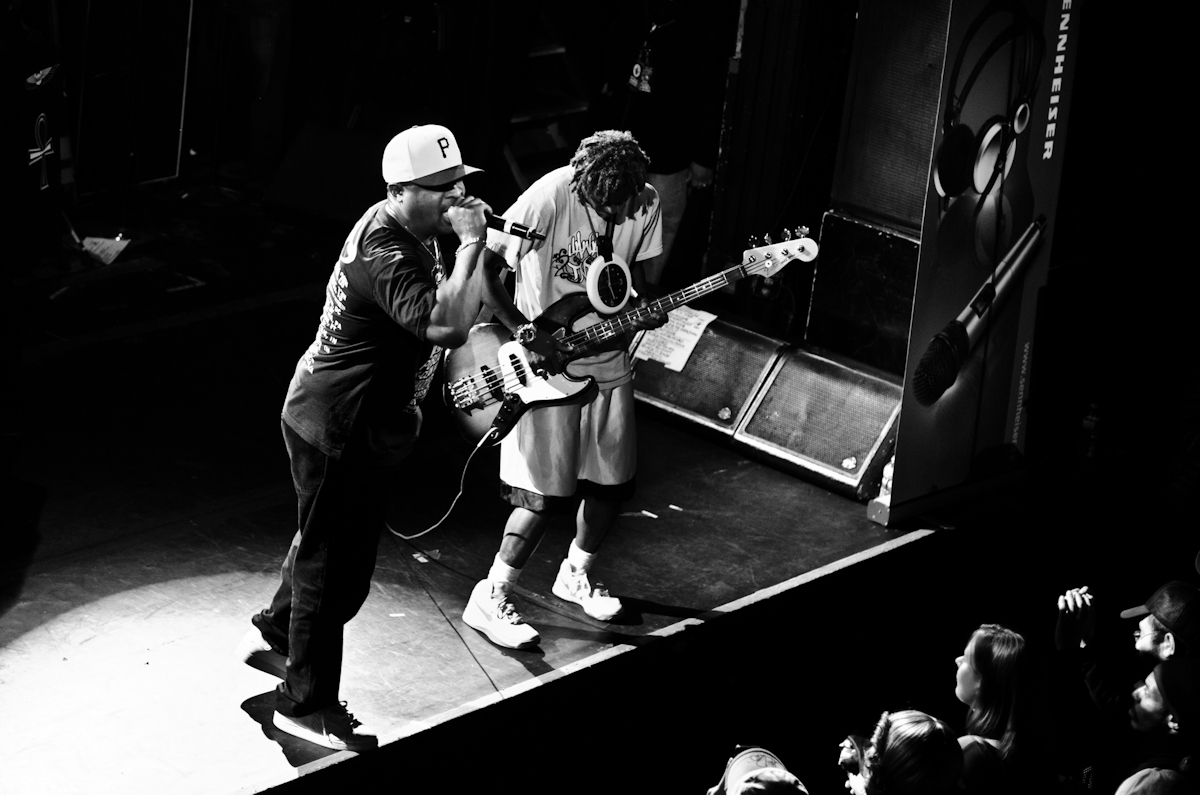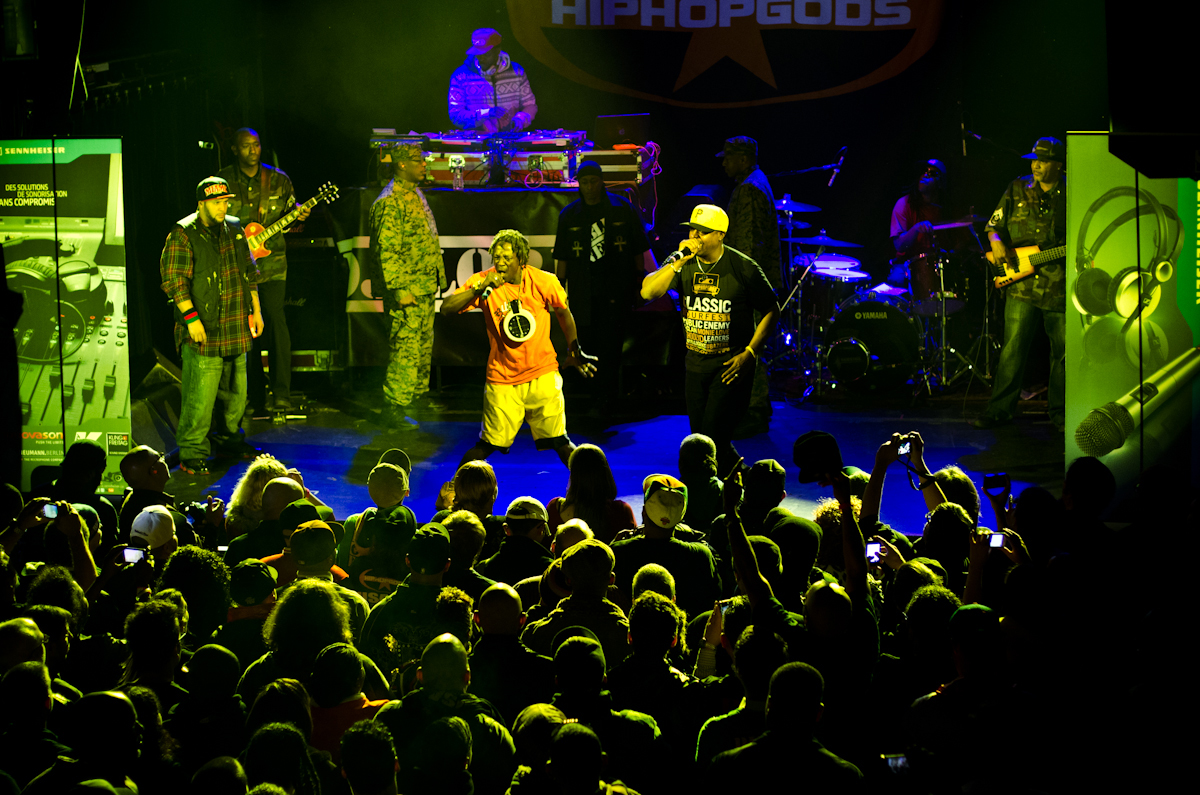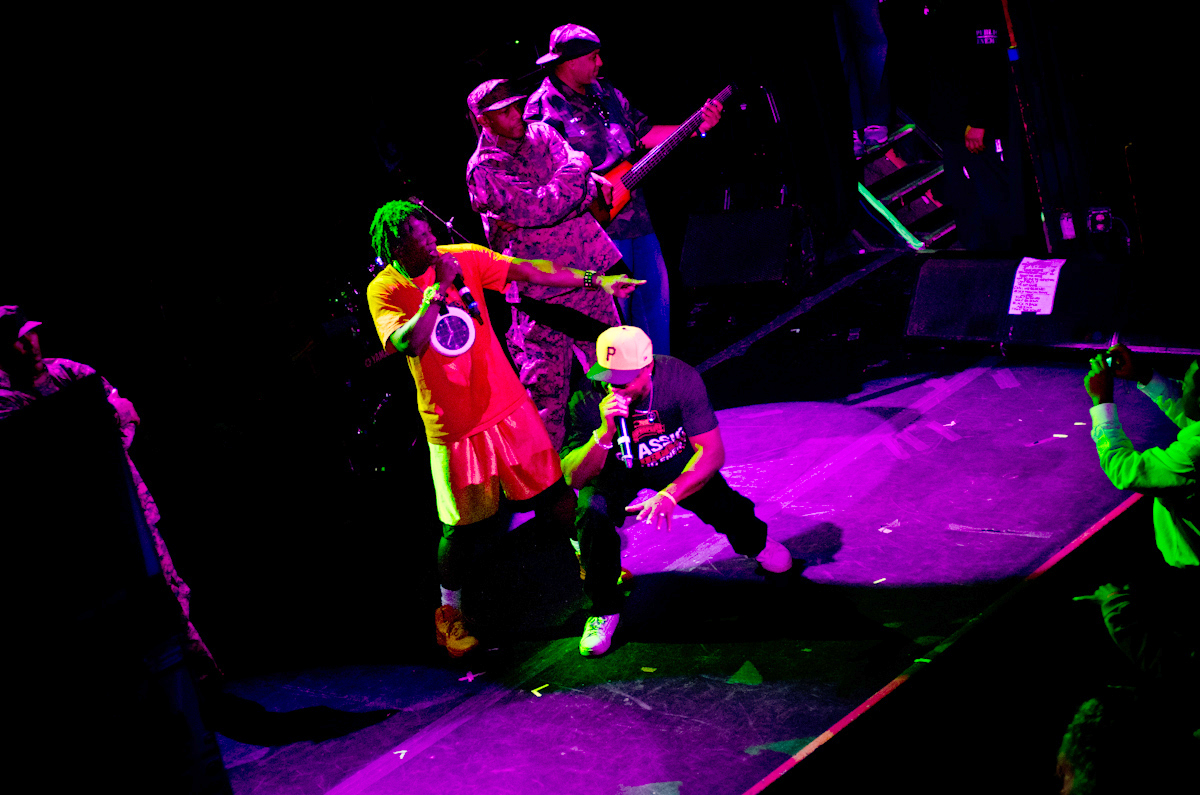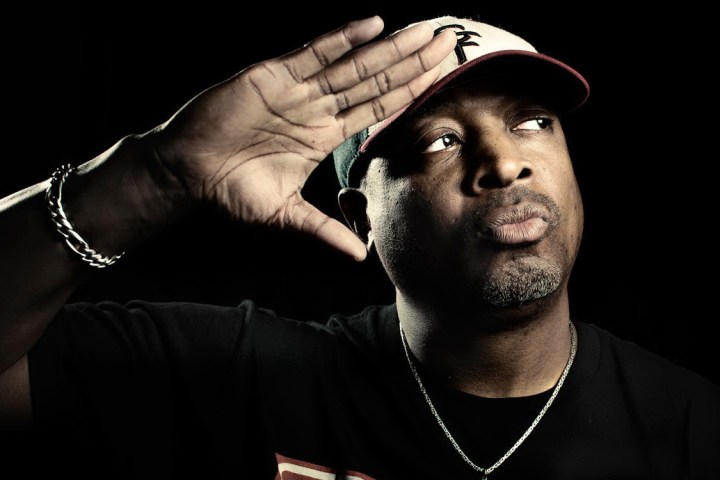
“The audience should buy into you before buying you.”
Chuck D has never been one to pull any punches, and he’s not gonna start now. “Didn’t you see this coming?” he roars on No Sympathy From the Devil, the opening track to Public Enemy’s ferocious new album Man Plans God Laughs, out now via their own custom label on various formats.
Staying true to modern sensibilities, Man Plans clocks in at a shrewdly economical 29 minutes and doesn’t let up for a second, from the unrelenting societal sparring on the title track to the straight-up sonic tripping of Lost in Space Music. “The audacity of the human challenge to the higher force that has its plans all laid out — that’s what I wanted to convey and cover with this album,” explains Chuck. “Our thing was to pioneer the aspect of time, like how we could actually convey something that was clear and get the point across the proper way. To move forward, we had to reduce the time and make two-minute records.”
Digital Trends recently called Chuck D to discuss the sonic template for Man Plans, why he’s cool with streaming, and how much Public Enemy and The Rolling Stones have in common. Fight the power.
Digital Trends: Does being tagged a rap pioneer put any added weight on you when you’re delivering a new set of messages on a new album?
Chuck D: No, it’s not really a real weight. I don’t think it’s no pressure to be able to say what you really feel is the right thing, you know? If I didn’t feel it was the right thing, I’d go, “You know what? People are going to get caught up in this rhetoric of what I think at this particular time.” In hindsight, as you grow older, you look at things that you’ve said and done as a younger person and it’s easy to go, “Oh, I said that? I must have been out of my goddamned mind!” (both laugh) But to err is human, even if you have a point of view that might not be informed.
Well, I like how you put it on Lost in Space Music: “Every generation got their music.”
Right — every generation got their favorites, and they got their music. A lot of times, people try to bribe me and coax me into disrespecting some of the hip-hop that’s out today. I look at myself as a curator. As curator, you have to have a broadened scope as to not only what it was, but what it is, and, of course, what it is to be. And you’ve gotta give some room for that to come up.

One of the hallmarks of Public Enemy has always been how you’ve created new sounds, beats, and samples. I mean, by the time we got to Fear of a Black Planet (1990), my subwoofer really had to work it hard just to get through everything! (Chuck laughs) The records were so layered, and we had never really heard anything like that before.
Well, I do want to clarify — back then, it was The Bomb Squad: Eric “Vietnam” Sadler, Keith Shocklee, Hank Shocklee, and me, and then later people like Terminator X and Gary G-Wiz added the turntable on top of all that. That was very clear, and definitely distinct.
For this new album, we decided to go in the studio and do something that was inspired by Run the Jewels and what El-P was doing there. Killer Mike is such a wordsmith, and we were inspired by that too — and maybe a little of what Kendrick Lamar was saying, and, of course, what Kanye West did on Yeezus (2013).
And given today’s attention spans, saying all of it in under a half-hour makes a lot of sense.
Yeah. We approached it by saying that we’re going to look forward to having things hit the cutting room floor! (chuckles) And it wasn’t easy to look at something and go, “Well, this has got to hit the floor.”
“The new generation don’t want music thrown at them like a dollar thrown at a stripper.”
Even the rhyme phrases are different — it’s not the staccato, choppy style of youth. It’s more like old uncle sits on the porch and spits the words in a short amount of time.
It was the exact opposite point of view in 1988 when we made It Takes a Nation of Millions to Hold Us Back. Then, it was how far we could go in making an album. We made a 60-minute album because the appetite out there at that time was like, “I want more of this rap stuff!”
There really wasn’t a lot of rap music out there where the albums were the standard. It was a new standard from before, since rap and hip-hop had always been singles-oriented. Now it’s the opposite way in keeping albums shorter, because that appetite is fulfilled. Rap is everywhere.
It must be hard trying to be a sound guy in a visual world.
Digital has reversed the analog of everything, meaning that in the analog dominance of the days when I was growing up, you heard music first, and you set your imagination to it. You didn’t get to see that music until an artist was on American Bandstand, Soul Train, Hullaballoo, Shindig, Ed Sullivan, or whatever. And then it jostled with your imagination.
And when MTV came along in the ’80s, there was a 10-year grace period before music turned into a visual-audio experience, instead of an audio-visual one. It was the other way around. It was centered on attitude.
When you talk about the music artists of today, it goes digital, sight, sound, and style. Sound definitely isn’t first; it might even be second or third, or even fourth. Knowing all this, people see music first, which puts you into an understanding of what your audio is, how it’s driven into the listener, and how much audio is going to be part of the true experience. Today, people want a little bit less. We’re living in a different time.
Very true. So what do you think the best way people should listen to your music is — MP3, high-resolution 96/24 downloads, vinyl…?
It all depends on the apparatus you’ve got. I’m all about the words and getting the music across the best way I can. But thank God rap is on vinyl. It sounds warm. Man Plans God Laughs is also on CD, which is pretty much a digital mass copy. And then there’s also hi-res WAV files, which we offer in our RCS [Rap Central Station] digital music store.
“We’ve long understood that streaming is just radio.”
We want to innovate. We want to offer streaming options through RapSTATION, and also let you purchase downloads through RCS Music to heighten the experience sonically. But today’s generation, 25 and under, they aren’t sonic enthusiasts. And that’s one of the frustrations between generations.
Clarity is always important when we listen to Public Enemy records. You really have to make sure every word in your flow is heard clearly, because the message cannot be misunderstood.
With rock-and-roll and R&B lyrics, you can really get lost when they’re singing. And when you find out the word isn’t what you thought it was — like, was it Nikki or Rikki who was gonna lose that number [in Steely Dan’s Rikki Don’t Lose That Number] — that’s a whole other revealing process. Somebody saying they can’t understand what rappers are saying — rap will be clearer than that. So, yeah, that was important, finding that space — and putting it all in the liner notes.
We’re glad you did, because we’d take out those liner notes and read every single word.
Yeah, we called it “cereal boxing.” That’s what you’d do. You’d have it in front of you when you were at the kitchen table. You sat there, and you read the cereal box. (chuckles)
You seem to be cool with the Spotify universe, since you had Man Plans available for a while digitally before it even hit wax.
We had to go with Spotify. Look, we had an understanding for a very long time that streaming is just radio. Beats realized they could come along with a “lazy” radio license, like Pandora. I think people want to be turned on to music, but they want curators and jocks that really love it like they do.

I’m a firm believer that the new generation don’t want music thrown at them like a dollar thrown at a stripper. Treat the listener with some concern and some care, and show you love the music just like they do. DJs and jocks make it so clear, and that’s what Beats has to realize — they have to come to the table with curators, like Tidal.
How early did you feel you had to take control of your own destiny and become your own label?
We knew this when we left Def Jam in 1998. We were planning on leaving in ’95 or ’96, but the contract we had wouldn’t let us out. There wasn’t no animosity towards Def Jam as much as it was towards the dinosaur of the system.
We didn’t know exactly what we were going to do, but we had the sense that the Internet would be a place where we could do our business. In 1994, on our Muse Sick-n-Hour Mess Age album, there was a song called Harry Allen’s Interactive Super Highway Phone Call to Chuck D. Pretty much Harry was laying it out on that call how the music business was going to change, and we were recording that album in 1993.
“Today’s generation, 25 and under, they aren’t sonic enthusiasts.”
It wasn’t like we made these crazy predictions. We already saw the tree was leaning, and the storm was already happening. So we said, “You know what? We want to create our own world, man. Our own rules.” Fast-forward to 2015. We are in our own orbit. Man Plans God Laughs comes out on our own label, the label Gary G-Wiz and I own. The new philosophy is simple: Look at the quality of your system, not the quantity of comfort. The profit should happen off the little expenses you need to create your art. You don’t have to do 12 or 13 songs — you can make albums with six or seven songs like The Doors did, and release two or three albums a year. Shorter albums for the times.
And I believe that the audience should buy into you before buying you. They gotta be enveloped into what you’re all about — your philosophy and who you are, before they buy a piece of product.
I love the funky groove of Honky Talk Rules, which contains samples from The Rolling Stones’ Honky Tonk Women. Did you interact with The Stones personally to get that approved?
It was a very rewarding track for us. It was a struggle to get that approval, but we got it. We were invited down to their rehearsals to hang with them — just The Stones, and me and Gary G-Wiz. They were getting ready for their recent stadium tour. It was Mick, Keith, Charlie, Ron, and the people in their crew. And they did a four-hour rehearsal for just us! There’s nothing better than that. It was incredible!
Did you ever open for them?
No, but we would love to. We did open for U2. We jumped on the second half of that tour, did all the stadiums [on The Zoo TV Tour, September–November 1992]. But I would love to one day open up for The Stones.
They’re doing stuff at an age in rock no one else has ever done. And in an interesting parallel, you guys are The Rolling Stones of rap. You’re going to keep doing stuff that’s never been done before too.
That’s our nickname. At the beginning of one of the biggest records of our career called Harder Than You Think [from 2007’s How You Sell Soul to a Soulless People Who Sold Their Soul?], the first line goes, “What goes on? Rolling Stones of the rap game, not bragging / Lips bigger than Jagger, not sagging.” So we’ve been bragging on that. (laughs)
I’m looking forward to where it all goes. I’d love to see Public Enemy still doing it live 20 years from now. Again, no pressure on you.
Trust me, I don’t believe in no pressure. I’m all right. (laughs) Me and Flav, we have to keep ourselves in good shape, that’s for damn sure. Performing our records requires a lot of physicality, and we have a rule: Either you do the songs, or the songs do you. But yeah, there is a joy in it. It’s fun doing music; that’s the bottom line.
